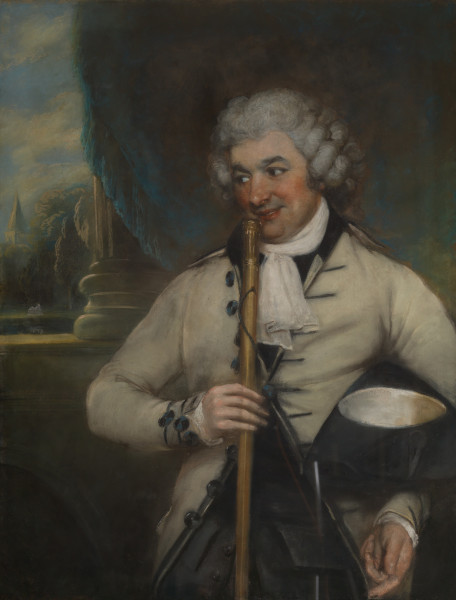Home
/
G0036
Drawings: G0036
Title
John Bannister
Technique
Other work on paper
Subject
Character
Lenitive : The Prize; or 2,3,5,8
Artist
Date
1802
Dimensions
Height (canvas): 97.8cm
width (canvas): 76.2cm
height (frame): 116cm
width (frame): 93cm
width (canvas): 76.2cm
height (frame): 116cm
width (frame): 93cm
Other materials
Pastel on paper
Inscription/signature
"J. Russell R.A. pinxit. 1802" (red chalk b. l.)
Provenance
The artist; his sale, Christie's 1807 (81); Charles Mathews
Other number
Mathews 306
RW/CKA 309
RW/CKA 309
Exhibition history
1802 London, R.A. (405)
1833 London, Queen's Bazaar, Oxford Street, "Mr Mathews's Gallery of Theatrical Portraits" (306)
Engraving history
W. Greatbach after a drawing by George Perfect Harding pub. Richard Bentley 1839, stipple and line 11.4x8.9
Literature
Theatre Arts Monthly, Volume 19 Issue 8 1935, reproduced; Arthur Griffiths 'The Pictures in the Garrick Club', Fortnightly Review (1886), p.374.
Lenitive, a doctor who talks pseudo-medical nonsense, is visiting his patient Heartwell. Lentive's servant brings news of a £10,000 prize with the lottery number 2 5 3 8. Lenitive decides to drop his profession and go off to woo Caroline. At the end of the play Lenitive hears that he has been misinformed about the lucky number.
Lenitive wears a wig with large curls at the sides (to which Caroline objects). In the Cumberland edition stage instructions the wig is described as "large and bushy" and the rest of the first act costume as "Gray coat and buff waistcoat, trimmed with black binding, and large black horn buttons - gray breeches and stockings - little cocked hat - cane - shoes and paste buckles."
In Russell's drawing Lenitive has a gold-topped cane and a black tricorn hat with a white lining. He wears a white coat with black buttons over a dark garment. Despite the fact that the scene is set inside Heartwell's house, there is a landscape view with a church spire.
Prince Hoare's musical farce, with music by Stephen Storace, was first performed by the Drury Lane company at the King's Theatre on 11 March 1793, with Bannister as the original Lenitive. He also played the part in the first performance at the Haymarket on 30 August 1793. Bannister remained popular in the role at both theatres until well into the 19th century.
Lenitive wears a wig with large curls at the sides (to which Caroline objects). In the Cumberland edition stage instructions the wig is described as "large and bushy" and the rest of the first act costume as "Gray coat and buff waistcoat, trimmed with black binding, and large black horn buttons - gray breeches and stockings - little cocked hat - cane - shoes and paste buckles."
In Russell's drawing Lenitive has a gold-topped cane and a black tricorn hat with a white lining. He wears a white coat with black buttons over a dark garment. Despite the fact that the scene is set inside Heartwell's house, there is a landscape view with a church spire.
Prince Hoare's musical farce, with music by Stephen Storace, was first performed by the Drury Lane company at the King's Theatre on 11 March 1793, with Bannister as the original Lenitive. He also played the part in the first performance at the Haymarket on 30 August 1793. Bannister remained popular in the role at both theatres until well into the 19th century.

